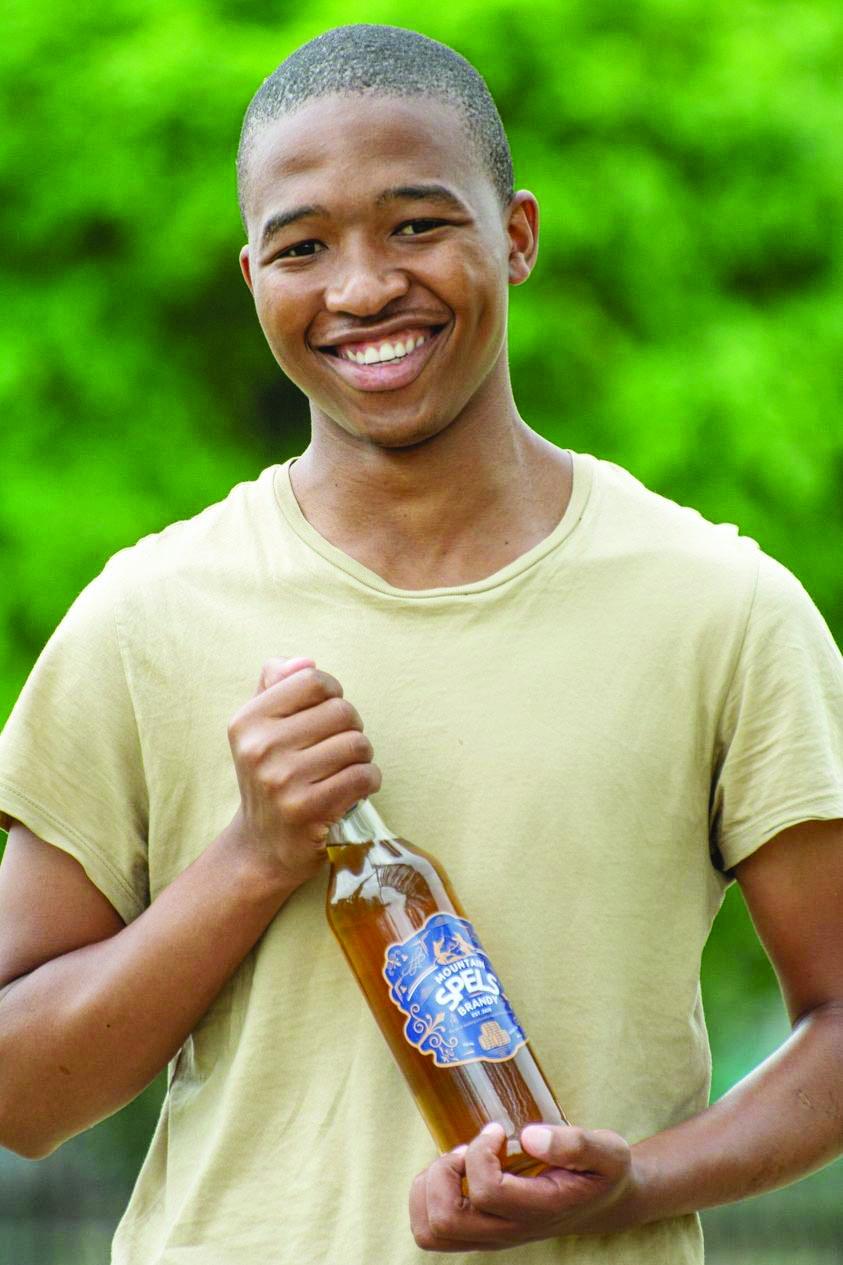Africa-Press – Lesotho. Mountain Spel Brandy, a locally distilled brandy is the newest creation by Mohapi Pule, an industrious National University of Lesotho (NUL) student. Pule, a Bachelor of Science in Nutrition student says there is more to brandy than giving joy to the heart of a dying man.
“The healthy nutrients in fruits that make brandy, end up in you when you drink it,” he says.
His brandy is produced by fermenting fruits into wine which is then distilled into brandy, while carrying the flavours and aroma of the original fruits.
The story of Pule’s life starts in Mphaki, Quthing, where he was born. He is the son of a hardworking woman who supports her family by producing traditional beer.
“She started brewing her beer well before I was born and is still producing it to this day,” he says about his mother.
His unique passion for producing alcoholic drinks was probably ignited long before he was born. “Mothers have a secret way of passing on not just their looks but their passions to their children,” Pule says.
He recalls how as a young boy growing up in the dusty rural streets of Mphaki he became involved in his mother’s beer making business from a tender age.
“Mostly, I was expected to fetch water for the brewing process, which I still do to this day when I visit home,” he says.
Fast-forward to the time when he found himself at Roma Valley, studying BSc in Nutrition at the country’s oldest and largest university. “At some point, I found that I had lost a purpose in life.
There was not a thing that I could say I was passionate about,” he sadly recalls. That situation, of course, threw him into a soul-searching mode which eventually took him back to his roots.
“During that soul-searching period, I recalled that when I was young, I used to imagine myself helping my mom to package the beer she was producing to distribute it countrywide,” he says.
From a young age, the issue of subsistence business was not Now here he was, worried that he might not amount to anything in life. Then, boom! an amazing idea comes!
“What if I make an alcoholic drink?” he recalls asking himself that question. He could have thought about any other type of business but, instead, he thought about her mother’s passion for producing alcohol.
One of the things he loves about alcoholic beverages is that they are popular. “I haven’t seen products as popular as alcoholic drinks,” he says. He might not be particularly right in that belief of his but the reality is the world finds great delight in alcohol, although some people over indulge in their drinks to their own detriment.
“Mabele khunoana ralitlhaku thabisa lihoho.
Mabele u tsoa kae e le khale re u batla re sa u thole? Ueeeena mabeeeele!” Now came the hardest part. What specific beverage should he focus on and how would he do it? He decided to focus on ciders since not many people in Lesotho produce ciders.
He started experimenting from home, and right away he realised that he could not get it right and there was no proper equipment. “You get the lesson therein.
If you want to do something — start — just start. That is the secret of innovators,” Pule says. He changed the tune as he learnt about other forms of beverages: the spirits.
“Spirits are very high in alcohol content. Here we are talking about the likes of whiskey, vodka and brandy,” he says. He was particularly interested in vodka.
He therefore went into one NUL laboratory and, with the necessary permission, he started testing a number of spirits and doing a lot of research about them.
He began saving part of his stipend from the National Manpower Development Secretariat (NMDS) in order to buy the required equipment. “But saving money is not easy.
The subsistence money is already not that much. Having to share it with a business is asking a little too much but I did it anyway. “I managed to secure small equipment that I thought would allow me to produce vodka.
“After buying the equipment, I only discovered that it was brandy equipment, not vodka’s so I was forced to get into brandy by chance,” he says.
But he is happy to realise that actually, few, if any, have tried a hand in brandy production in Lesotho. Now that he had already spent his money on the business, he thought he might as well make it work.
He became absorbed in experiments, read several books and even enrolled for an online course on distillation. In the end, there is a light at the end of the tunnel.
“I’m beginning to feel a difference in the taste of my produce.
“I have shared my produce with my lecturers and they are over the moon!”
He says after his lecturers cheered him on, he packaged his brandy which he is now selling to family members and friends. “Owing to small equipment, I can’t produce too much. If I were to get bigger equipment, things would be much better.”






